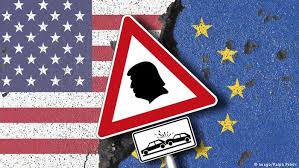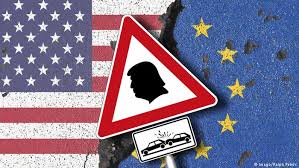
Anticipating that the United States president Donald Trump could impose import tariffs on European vehicles, ministers of the block got together to discuss when the EU should initiate talks on trade with the US because they fear that the tariff would be imposed if there is delay in negotiating with the Trump administration.
In order to allow for beginning for formal talks, EU's 28 countries have been asked to approve two negotiating mandates by the European Commission. But there is some difference between the EU members, while France is in favour of waiting for some time before engaging with Trump, Germany wants negotiations to begin right away.
Last July the EU and the US ended a few months of trade hostilities after Trump agreed to postpone the imposition of additional tariffs on European cars and auto parts into the country so that some trade agreement could be arrived at between the parties. .
The two parties agreed to create framework that would ultimately remove tariffs on "non-auto industrial goods" and allow space for holding discussions for product standards to increase trade and increase import of US soybeans and liquefied natural gas into the EU.
The EU now wants to begin deliberations with the US to reduce tariffs which could also include those for cars and are also hoping to hold separate discussions on creating frameworks that would make it easier for companies to get their products cleared for sale both in the EU and in the US.
There are three primary issues that the ministers would be discussing.
The first is related to timing of the talks. There is an understandable keenness on the part of Germany to press ahead with talks as soon as possible because the cars exported form the country to the US accounts for half of the total cars exported from the EU to the US. On the other hand France ideally would want the completion of the European Parliament elections to be held in May this year before initiating negotiations.
The second issue is to whether or not to include fisheries in the discussions even though it technically is considered to be an industrial product. There is concern among some EU members such as France that opening up the sector would increase undue competition or more competition than the industry can handle because it is already under pressure because of Brexit.
And the third issue is to decide about the earlier broader "TTIP" negotiations which saw thousands coming out on to the streets of Europe in protest. According to the European Commission, the shortened trade deal that it has proposed should not be considered to be a rehashed TTIP launch.
Industrial good tariffs are already low, at around 4 percent.
The Commission believes that if that rate is brought down further, exports to the US from the EU would get boosted by as much as 8 per cent and there would also be a corresponding increase of 9 per cent of US exports into eth EU by 2033.
(Source:www.moneycontrol.com)
In order to allow for beginning for formal talks, EU's 28 countries have been asked to approve two negotiating mandates by the European Commission. But there is some difference between the EU members, while France is in favour of waiting for some time before engaging with Trump, Germany wants negotiations to begin right away.
Last July the EU and the US ended a few months of trade hostilities after Trump agreed to postpone the imposition of additional tariffs on European cars and auto parts into the country so that some trade agreement could be arrived at between the parties. .
The two parties agreed to create framework that would ultimately remove tariffs on "non-auto industrial goods" and allow space for holding discussions for product standards to increase trade and increase import of US soybeans and liquefied natural gas into the EU.
The EU now wants to begin deliberations with the US to reduce tariffs which could also include those for cars and are also hoping to hold separate discussions on creating frameworks that would make it easier for companies to get their products cleared for sale both in the EU and in the US.
There are three primary issues that the ministers would be discussing.
The first is related to timing of the talks. There is an understandable keenness on the part of Germany to press ahead with talks as soon as possible because the cars exported form the country to the US accounts for half of the total cars exported from the EU to the US. On the other hand France ideally would want the completion of the European Parliament elections to be held in May this year before initiating negotiations.
The second issue is to whether or not to include fisheries in the discussions even though it technically is considered to be an industrial product. There is concern among some EU members such as France that opening up the sector would increase undue competition or more competition than the industry can handle because it is already under pressure because of Brexit.
And the third issue is to decide about the earlier broader "TTIP" negotiations which saw thousands coming out on to the streets of Europe in protest. According to the European Commission, the shortened trade deal that it has proposed should not be considered to be a rehashed TTIP launch.
Industrial good tariffs are already low, at around 4 percent.
The Commission believes that if that rate is brought down further, exports to the US from the EU would get boosted by as much as 8 per cent and there would also be a corresponding increase of 9 per cent of US exports into eth EU by 2033.
(Source:www.moneycontrol.com)





